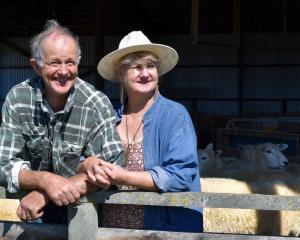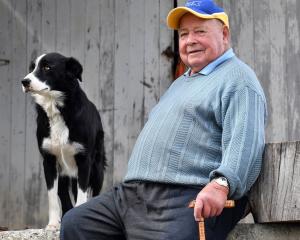
Mrs Barrett and her family — husband Phil, mother Jimsie Martin, 84, and children Liam, 14, and Jacquelyn, 12, farm the original 32.37ha ballot block, which her great-grandfather bought at the head of the Catlins Lake in 1893.
All of the other original ballot blocks in the surrounding area were now part of bigger farms, she said.
The family was among those honoured for farming their land for more than 100 years at The New Zealand Century Farm and Station Awards in Lawrence on Saturday.
A family farming the same land for more than a century was worth celebrating, no matter the size of the property, Mrs Barrett said.
The award would honour the hard work and perseverance of every generation of her family who never walked away when the going got tough.
Her great-grandfather Malcolm Allan immigrated from Northern Ireland and was allocated the exposed coastal bush block on a hill in Ratanui, south of Owaka.
One of her great-grandmother’s friends from Canterbury nicknamed the farm Catlins Pleasant Point, and the name stuck.
"It should have been called Windy Point," Mr Barrett said.
Strong and cold winds could batter the farm from most directions.
The family were recently renovating their home when a wind gust caught builders unaware, lifting a sheet of glass from the deck and smashing it.
It could be raining in the back yard and fine in the front yard.
"It is crazy," Mr Barrett said.
But the loam soil on the farm could handle plenty of rainfall.
Liam said being able to work in the rain was vital to farm in the Catlins.
"If you waited all day for it to stop raining, you wouldn’t get anything done," he said.
Mrs Barrett said a benefit of heavy rainfall was being able to go see nearby Purakaunui Falls at its most spectacular.
Mr Barrett applauded the early settlers who cleared the land with limited resources, and lived in cold houses.
"You have to take your hat off to them. It must have been a tough life."
Mrs Barrett’s great-grandfather married Ellen Stansfield, who moved to the area from Dunedin to keep house for her brother Bob Stansfield, who ran the Ratanui Store.
The pioneer settlers started a family and continued to clear bush while he worked at Ratanui Station and local sawmills.
As time and resources allowed, they built a homestead, room-by-room, on Catlins Pleasant Point.
The homestead was inhabitable, but its foundations made from rata stumps remain.
Mr Allan moved from Catlins Pleasant Point to Alaska to search for gold.
"He was acclimatised to the weather," Mr Barrett joked.
His wife remained on the farm to raise their four children. Mr Allan never struck gold, and returned home two years later. The couple had three more children.
Their daughter Ellen Allan was born in 1904 and married John Martin in 1929.
The couple settled at Caberfiedh, a settlement near Papatowai, and had a son, Colin Martin — Mrs Barrett’s father.
When Colin was young, he moved to live with his grandmother Ellen, uncle Jack and aunt Mary at Catlins Pleasant Point, and attended Ratanui School.
Colin would visit his parents in Caberfiedh at the weekends and help his father clear native trees, destined to be shafts in Kaitangata Mine.
At Catlins Pleasant Point, Uncle Jack continued to break in the land — stumping, ploughing and discing with horses.

The first livestock introduced to the farm were calves and pigs to feed the family.
A dozen Jersey shorthorn cross dairy cows foraged around the stumps, and were hand-milked.
The milking shed featured a loft and pulley system to store hay to feed the horses.
When electricity arrived on the farm, an electric milk and cream separator was bought, and they began selling milk to the Owaka Butter Factory.
Uncle Jack bought an International TD-6 crawler tractor and more land was broken in, allowing them to stop milking cows and run 300 sheep.
At the time, wool prices were high due to strong export demand.
Improvements on the farm included extensions to the homestead, new fences, a garage and a woolshed, which was built on side of the milking shed in 1957.
The roof of the woolshed blew off last year.
Mrs Martin (nee Roger) recalled Colin, her fiance, ordering an International BTD-6 crawler bulldozer in 1958 and it delaying their wedding day.
"He told me we couldn’t get married until the bulldozer was paid off — that’s always been the family joke," she said.
The couple married in 1961 and settled on a farm about 1km away. The families worked both properties.
Colin and Jimsie raised two children, including Lynelle.
Family friends encouraged Mrs Barrett to one day leave the district to learn skills which she could bring back to her community.
She did leave, and lived across New Zealand and Australia, but there was always a strong pull to return home.
"I was always homesick.
"When I was growing up this is where I wanted to settle," she said.
The Barrett family moved on to the farm in 2012.
"You brought a lot of skills to the Catlins when you brought me back," Mr Barrett, a mechanic from Clutha farming stock, said.
To diversify the farm business, the Martin family built tourist accommodation on the farm. Part of the visitor experience was being with the animals.
Now the family runs about 100 sheep, a mix of poll Romney, Dorset and Texel, and 30 cattle, mostly speckle park cross and Hereford cross.
The tourist accommodation arm has stopped for now.
Colin died in 2017, aged 86, and Jimsie now lives on the farm.
Mrs Barrett said there was nowhere she would rather live.
"This has always been a precious place."
The Martin and Barrett families were among the 40 New Zealand families to receive awards over the weekend.
Mrs Barrett encouraged any eligible family to apply because it was a way to capture and preserve a family history that might otherwise be lost.
Families submit narratives of their farm history, which was then archived at the Alexander Turnbull Library in Wellington.
Applications are now open for the 2024 year, and families which had owned and farmed their land since 1924 could apply.
The deadline for applications is November 30.















